-
RESEARCH01-01-2017
Health education with older adults: action research with primary care professionals
Revista Brasileira de Enfermagem. 2017;70(4):792-799
Abstract
RESEARCHHealth education with older adults: action research with primary care professionals
Revista Brasileira de Enfermagem. 2017;70(4):792-799
DOI 10.1590/0034-7167-2016-0349
Views0See moreABSTRACT
Objective:
To assess the development and implementation of permanent education action.
Method:
Quantitative-qualitative research based on action research in three phases (diagnosis of reality, implementation of activity and evaluation), performed with health professionals and managers of basic health units. The evaluation was on the perception of changes immediately following the activity and after 120 days.
Results:
In the first phase, 110 professionals took part, 36.4% of whom indicated the existence of groups for older adults at work. In the second phase, 98 professionals participated, pointing out interferences of the group in the life of older adults, items of importance and facilitation in forming groups and developing reality-based activities. The third phase showed, in the quantitative analysis, positive impact of the training, and in the qualitative analysis, reassessment of groups, greater knowledge and confidence in managing groups and increased respect for older adults.
Final considerations:
Permanent education opens pathways for the construction of differentiated care for older adults based on respect and health promotion.

-
RESEARCH01-01-2017
Older adults abuse in three Brazilian cities
Revista Brasileira de Enfermagem. 2017;70(4):783-791
Abstract
RESEARCHOlder adults abuse in three Brazilian cities
Revista Brasileira de Enfermagem. 2017;70(4):783-791
DOI 10.1590/0034-7167-2017-0114
Views0See moreABSTRACT
Objective:
To analyze the police reports filed by older adults who suffered abuse in order to identify the socio-demographic characteristics of victims and aggressors, type of violence, location, as well as to compare rates in three Brazilian cities in the period from 2009 to 2013.
Method:
Ecological study, in which 2,612 police reports registered in Police Stations were analyzed. An instrument was used to obtain data from the victim, the aggressor and the type of violence.
Results:
Psychological abuse predominated and most cases occurred in the older adults own home. In the cities of Ribeirão Preto and João Pessoa, the older adults presented similar rates for both gender. Regarding the standardized rates, in João Pessoa, there was a rise of this type of abuse in the two first years, and later there was a certain stability. In the city of Teresina, there was an increase, also observed in the city of Ribeirão Preto in the three first years, followed by a decrease.
Conclusion:
Older adults abuse is a cultural phenomenon difficult to be reported by them, since it occurs in the family context.

-
RESEARCH01-01-2017
Validation of educational booklet for HIV/Aids prevention in older adults
Revista Brasileira de Enfermagem. 2017;70(4):775-782
Abstract
RESEARCHValidation of educational booklet for HIV/Aids prevention in older adults
Revista Brasileira de Enfermagem. 2017;70(4):775-782
DOI 10.1590/0034-7167-2017-0145
Views0See moreABSTRACT
Objective:
To describe the process of manufacturing and validation of an educational booklet for HIV/Aids prevention in older adults
Methods:
Methodological study developed in two phases – manufacturing of the booklet and validation of the educational material by judges. The manufacturing process involved a situational diagnosis with older adults, and its result indicated gaps in the knowledge with respect to HIV/Aids. The validation process was performed by nine judges, selected by convenience. It was considered an agreement index of at least 0.80, analyzed through the content validity index.
Results:
We opted for a dialogue between two older adults divided into three categories: myths and taboos; ignorance; and prevention and importance of diagnosis. The average of the items was 0.90. The suggestions made by the judges were observed and modified for the final version.
Conclusion:
The material had relevant content for the judges, in addition to being able to be used by health professionals in the education and clarification of issues on the subject.

-
RESEARCH01-01-2017
Association between filial responsibility when caring for parents and the caregivers overload
Revista Brasileira de Enfermagem. 2017;70(4):767-774
Abstract
RESEARCHAssociation between filial responsibility when caring for parents and the caregivers overload
Revista Brasileira de Enfermagem. 2017;70(4):767-774
DOI 10.1590/0034-7167-2017-0133
Views0See moreABSTRACT
Objective:
To analyze the association between filial responsibility and the overload of the children when caring for their older parents.
Method:
Cross-sectional study with 100 caregiver children of older adults. Filial liability was assessed by the attitudes of the responsible child (scale of expectation and filial duty) and by care behaviors (assistance in activities of daily living, emotional and financial support, and keeping company). The overload was assessed by the Caregiver Burden Inventory. To assess the associations, the correlation coefficients of Pearson and Spearman, Kruskal-Wallis Test, and Mann-Whitney were employed. Variables that presented p-value<0.20 in the bivariate analysis were inserted in a multivariate linear regression model.
Results:
The factors associated with overload were: formal employment (p=0.002), feelings regarding family life (p<0.001), financial support (p=0.027), and assistance with Activities of Daily Living (ADLs) (p<0.001).
Conclusion:
Children who were more involved with the ADLs and provided financial support showed higher levels of overload.
-
RESEARCH01-01-2017
Religiosity and spirituality as resilience strategies among long-living older adults in their daily lives
Revista Brasileira de Enfermagem. 2017;70(4):761-766
Abstract
RESEARCHReligiosity and spirituality as resilience strategies among long-living older adults in their daily lives
Revista Brasileira de Enfermagem. 2017;70(4):761-766
DOI 10.1590/0034-7167-2016-0630
Views0See moreABSTRACT
Objective:
to investigate religiosity and spirituality as a resilience strategy for the long-living older adults in their daily lives.
Method:
Qualitative research of phenomenological approach based on Martin Heidegger thoughts. Interviews were conducted with 14 older adults registered at a family health unit in the city of Jequié, BA, Brazil. The data were analyzed in the light of Being and Time.
Results:
The results revealed that God occupies a central position in their lives, and the reading of the bible, praying the rosary and prayers are resilience strategies used for coping with unfavorable situations, recovery and/or maintenance of health, personal and family protection, and, above all, the experience of a satisfactory aging.
Final considerations:
Religiosity and spirituality were presented as an important resilience strategy in the existence of older adults, showing that through them it is possible to achieve well-being and cope with health and social problems.

-
RESEARCH01-01-2017
Family of older adults with mental disorder: perception of mental health professionals
Revista Brasileira de Enfermagem. 2017;70(4):753-760
Abstract
RESEARCHFamily of older adults with mental disorder: perception of mental health professionals
Revista Brasileira de Enfermagem. 2017;70(4):753-760
DOI 10.1590/0034-7167-2016-0646
Views0See moreABSTRACT
Objective:
to understand the perceptions of healthcare professionals of the Psychosocial Care Centers regarding the family of older adults with mental disorders.
Method:
study of a Qualitative Case conducted with 12 healthcare professionals from a Psychosocial Care Center, with a convenient and exhaustive sample. Conducting semi-structured interviews to collect data, which were analyzed with the Content Analysis technique.
Results:
the following categories stood out: “Family exhaustion and deterioration in the perception of the healthcare professional” and “The abandonment of older adults by family members and their distancing in the perception of the healthcare professional.”
Final considerations:
culpability of older adults and penalization of the family were verified by healthcare professionals. To bring awareness about the difficulties faced in the attempt to bring the family closer to the healthcare service, it is necessary to analyze the care given to the older adult and to overcome challenges in the effective construction of the bond between family, healthcare user and mental health service.
-
RESEARCH01-01-2017
Frailty in the elderly: prevalence and associated factors
Revista Brasileira de Enfermagem. 2017;70(4):747-752
Abstract
RESEARCHFrailty in the elderly: prevalence and associated factors
Revista Brasileira de Enfermagem. 2017;70(4):747-752
DOI 10.1590/0034-7167-2016-0633
Views0See moreABSTRACT
Objective:
to know the prevalence and factors associated with frailty in elderly assisted by the Centro Mais Vida de Referência em Assistência à Saúde do Idoso (Mais Vida Health Reference Center for the Elderly) in the North of Minas Gerais, Brazil.
Method:
cross-sectional study, with sampling by convenience. Data collection occurred in 2015. Demographic and socioeconomic variables, morbidities, use of health services and the score of the Edmonton Frail Scale were analyzed. The adjusted prevalence ratios were obtained by multiple analysis of Poisson regression with robust variance.
Results:
360 elderly aged 65 or older were evaluated. Frailty prevalence was 47.2%. The variables associated with frailty were the following: advanced age elderly, who live without a partner, have a caregiver, present depressive symptoms, osteoarticular disease, as well as history of hospitalization and falls in the last twelve months.
Conclusion:
knowledge of factors associated with frailty allows development of health actions aimed at the elderly.
-
RESEARCH01-01-2017
Falls in long-term care institutions for elderly people: protocol validation
Revista Brasileira de Enfermagem. 2017;70(4):740-746
Abstract
RESEARCHFalls in long-term care institutions for elderly people: protocol validation
Revista Brasileira de Enfermagem. 2017;70(4):740-746
DOI 10.1590/0034-7167-2017-0109
Views1See moreABSTRACT
Objectives:
To validate the content of a fall management risk protocol in long-term institutions for elderly people.
Methods:
Methodological, quanti-qualitative study using the Delphi technique. The tool, based on the literature, was sent electronically to obtain consensus among the 14 experts that meet the defined inclusion criteria.
Results:
The 27 indicators of the protocol are organized in three dimensions: prepare for the institutionalization (IRA=.88); manage the risk of falls throughout the institutionalization (IRA=.9); and lead the communication and formation (IRA=1), with a CVI=.91. Two rounds were performed to get a consensus superior to 80% in every item.
Conclusion:
The values obtained in the reliability test (>0.8) show that the protocol can be used to meet the intended goal. The next step is the clinic validation of the protocol with residents of long-term care institutions for elderly people.
-
ORIGINAL ARTICLE06-14-2021
Continuity of neuro-psychomotor stimulation of children with congenital Zika syndrome
Revista Brasileira de Enfermagem. 2021;74(6):e20200694
Abstract
ORIGINAL ARTICLEContinuity of neuro-psychomotor stimulation of children with congenital Zika syndrome
Revista Brasileira de Enfermagem. 2021;74(6):e20200694
DOI 10.1590/0034-7167-2020-0694
Views0See moreABSTRACT
Objective:
Understand the continuity of stimulation of neuro-psychomotor development in children with congenital Zika syndrome.
Method:
Descriptive-exploratory study with theoretical support in symbolic interactionism. Between August and November 2019, 12 health professionals were interviewed in depth; and to the focus group, seven caregivers of children with the syndrome. The analysis was thematic inductive.
Results:
The continuation of neuro-psychomotor stimulation of children with Zika syndrome goes through: organizational difficulties (lack of doctors, professional unpreparedness, dissatisfaction and search for other services); socioenvironmental aspects (low maternal education, low socioeconomic level, difficulty in moving and lack of support); and conditions inherent to children (hospitalizations for respiratory crises, seizures, hypoactivity and social stigma).
Final considerations:
A strengthened support network with qualified human resources is necessary in order to provide comprehensive care and avoid the discontinuity of neuro-psychomotor stimulation of children with congenital Zika syndrome.
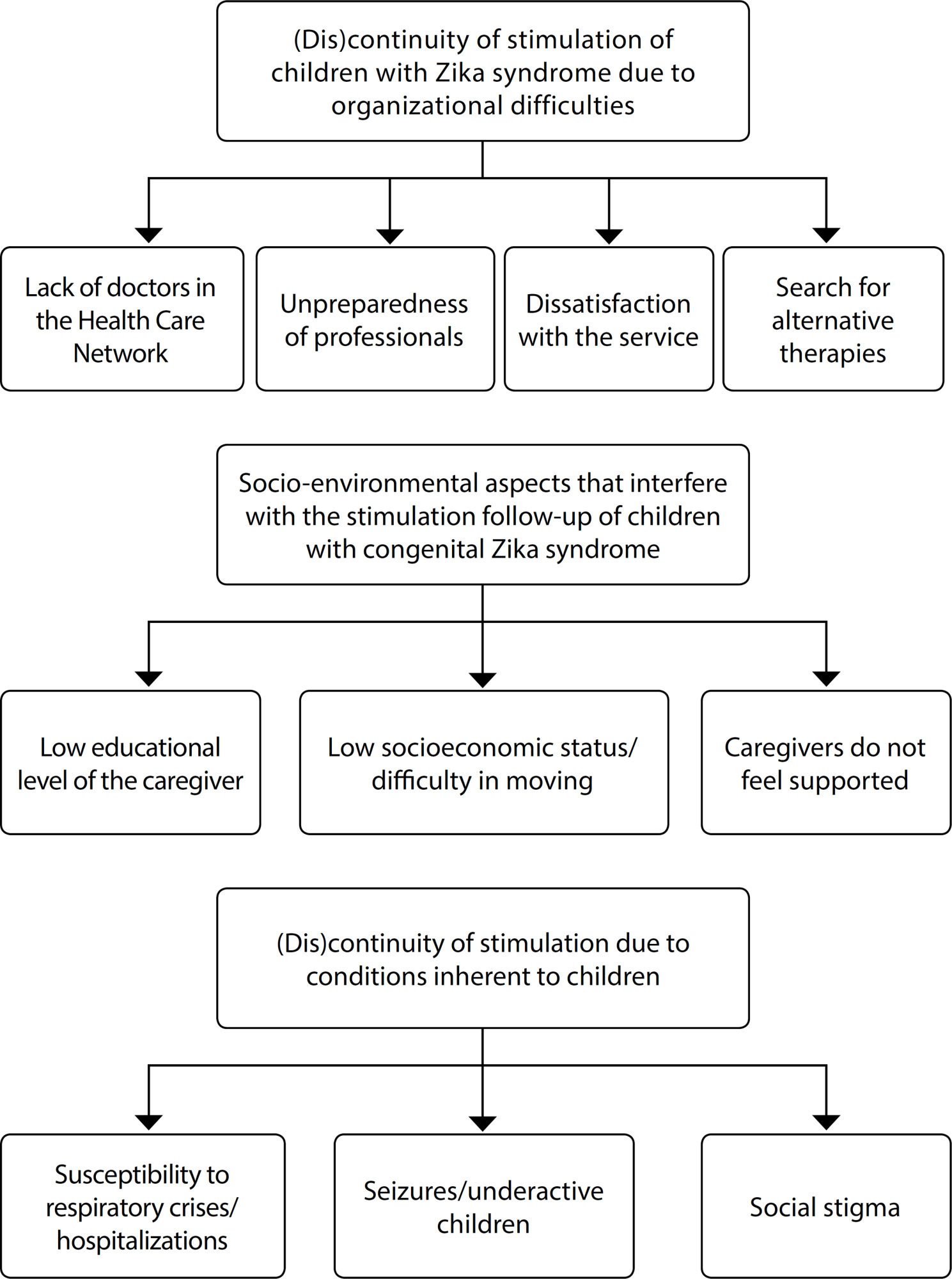
-
ORIGINAL ARTICLE08-20-2021
Risk of suicide among nursing students
Revista Brasileira de Enfermagem. 2021;74(6):e20200867
Abstract
ORIGINAL ARTICLERisk of suicide among nursing students
Revista Brasileira de Enfermagem. 2021;74(6):e20200867
DOI 10.1590/0034-7167-2020-0867
Views0See moreABSTRACT
Objectives:
to identify the risk and degree of risk of suicide in nursing students of a public institution in the countryside of Pernambuco, Brazil.
Methods:
this was a cross-sectional, quantitative research conducted with 150 students. For data collection, a sociodemographic questionnaire and the instrument, M.I.N.I. – Brazilian version 5.0.0 – Module C – Risk of suicide were used. Statistical analyses were performed with IBM(® )SPSS(®), version 23.
Results:
53.3% of nursing students had a risk of suicide, of which 20.7% had a high risk. Moreover, 22.67% reported previous suicide attempt. It is noteworthy that students without a partner have a higher risk of suicide (56.8%) than those with a partner (29.4%).
Conclusions:
it is perceived the need to develop programs that identify students at risk of suicide in higher education institutions, in order to raise awareness of the problem and implement policies to promote mental health in the academia.
-
REVIEW08-20-2021
Root Cause Analysis, Failures and Effects in pediatric total quality management: a scoping review
Revista Brasileira de Enfermagem. 2021;74(6):e20200954
Abstract
REVIEWRoot Cause Analysis, Failures and Effects in pediatric total quality management: a scoping review
Revista Brasileira de Enfermagem. 2021;74(6):e20200954
DOI 10.1590/0034-7167-2020-0954
Views0See moreABSTRACT
Objectives:
to analyze the applicability of Root Cause Analysis and Failure Mode and Effect Analysis tools, aiming to improve care in pediatric units.
Methods:
this is a scoping review carried out according to the Joanna Briggs Institute guidelines, following the Preferred Reporting Items for Systematic Reviews and Meta-Analyzes extension for Scoping Reviews. Search took place in May 2018 on 15 data sources.
Results:
search totaled 8,254 studies. After using the relevant inclusion and exclusion criteria, 15 articles were included in the review. Of these, nine were published between 2013 and 2018, 12 used Failure Mode and Effect Analysis and 11 carried out interventions to improve the quality of the processes addressed, showing good post-intervention results.
Final Considerations:
the application of the tools indicated significant changes and improvements in the services that implemented them, proving to be satisfactory for detecting opportunities for improvement, employing specific methodologies for harm reduction in pediatrics.
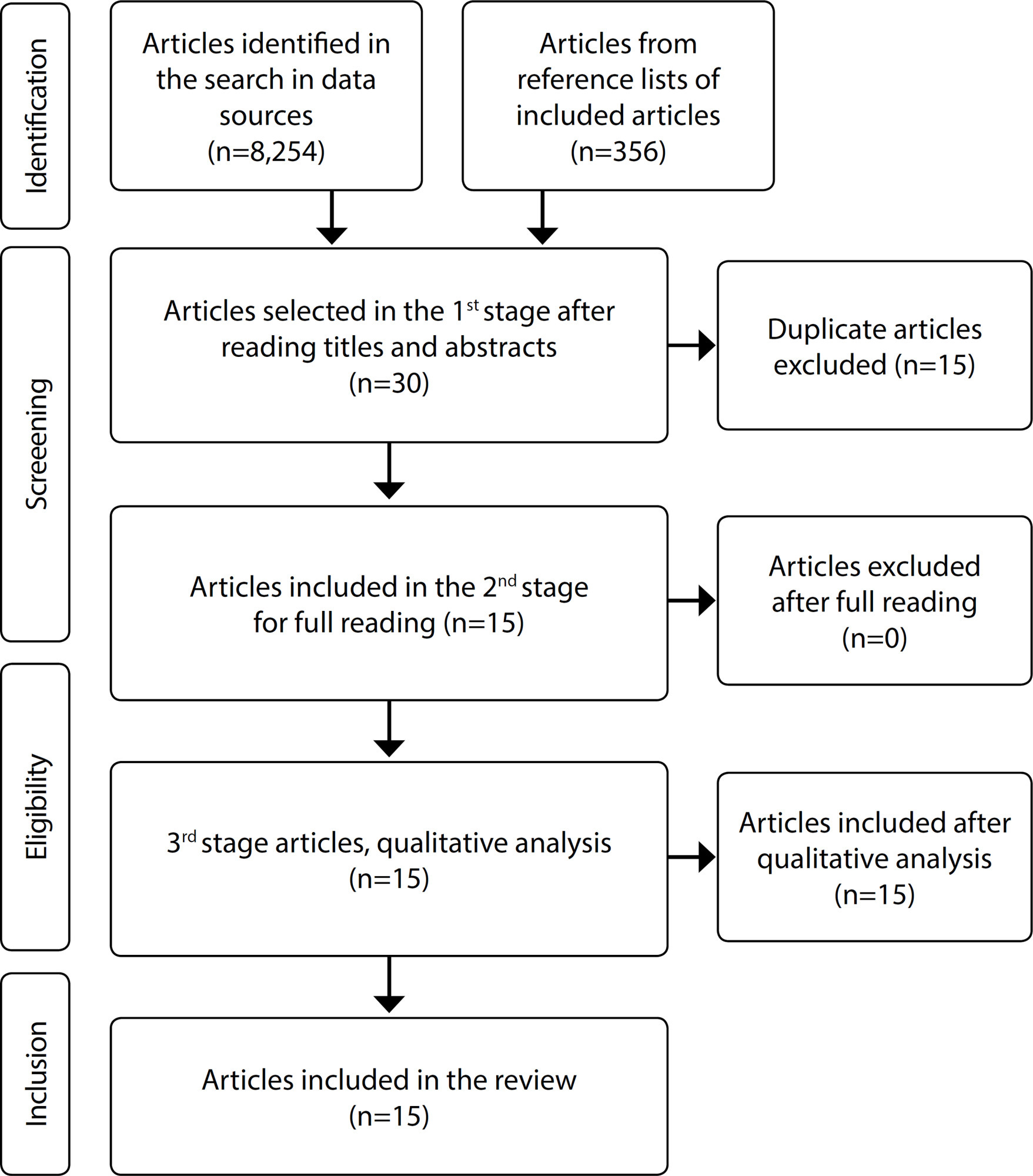
-
ORIGINAL ARTICLE07-26-2021
Representations about sexuality of people diagnosed late with HIV infection
Revista Brasileira de Enfermagem. 2021;74(6):e20201028
Abstract
ORIGINAL ARTICLERepresentations about sexuality of people diagnosed late with HIV infection
Revista Brasileira de Enfermagem. 2021;74(6):e20201028
DOI 10.1590/0034-7167-2020-1028
Views0See moreABSTRACT
Objective:
to understand the representations about sexuality of people diagnosed late with HIV infection and its implications in the delayed search for diagnosis.
Methods:
this is a qualitative study, whose theoretical and methodological framework was Social Representation Theory. The research was carried out with 18 people diagnosed late with HIV infection through an open interview. For data analysis, Structural Narration Analysis was used, with support from MAXQDA 12®.
Results:
representations about sexuality contributed to delayed diagnosis, such as trust in a fixed partnership, sexual intercourse is natural, sexuality as a taboo, search for pleasure in sexual intercourse, regardless of risks, denial of risk for HIV infection.
Final considerations:
representations about sexuality participate in a web of stereotypes and riskier ways of living, which contribute to delayed diagnosis. Sexual health education remains necessary and essential throughout people’s lives.
-
08-20-2021
Prevalence of central venous catheter salvage in newborn with staphylococcal bloodstream infection
Revista Brasileira de Enfermagem. 2021;74(6):e20201073
Abstract
Prevalence of central venous catheter salvage in newborn with staphylococcal bloodstream infection
Revista Brasileira de Enfermagem. 2021;74(6):e20201073
DOI 10.1590/0034-7167-2020-1073
Views0See moreABSTRACT
Objectives:
to establish the prevalence of salvage of central venous catheters in newborns with bloodstream infection caused by coagulase-negative staphylococci.
Methods:
retrospective cross-sectional study with 136 newborns admitted to the Neonatal Intensive Care Unit between 2011 and 2017. The total of 143 infection events undergoing antibiotic therapy were evaluated.
Results:
among the 143 infection events, 39 catheters in which antibiotic therapy was used were saved and in 69 cases, the device was removed. Positive central blood culture and single lumen catheter were factors associated with salvage failure. The probability of salvage decreased with infections diagnosed from 15 days of using the catheter. Negative blood culture raised the chance of salvage by fourfold.
Conclusions:
the use of antibiotic therapy in the treatment of infections resulted in a low prevalence of salvage of the central venous catheter. The probability of salvage was associated with variables of the device.
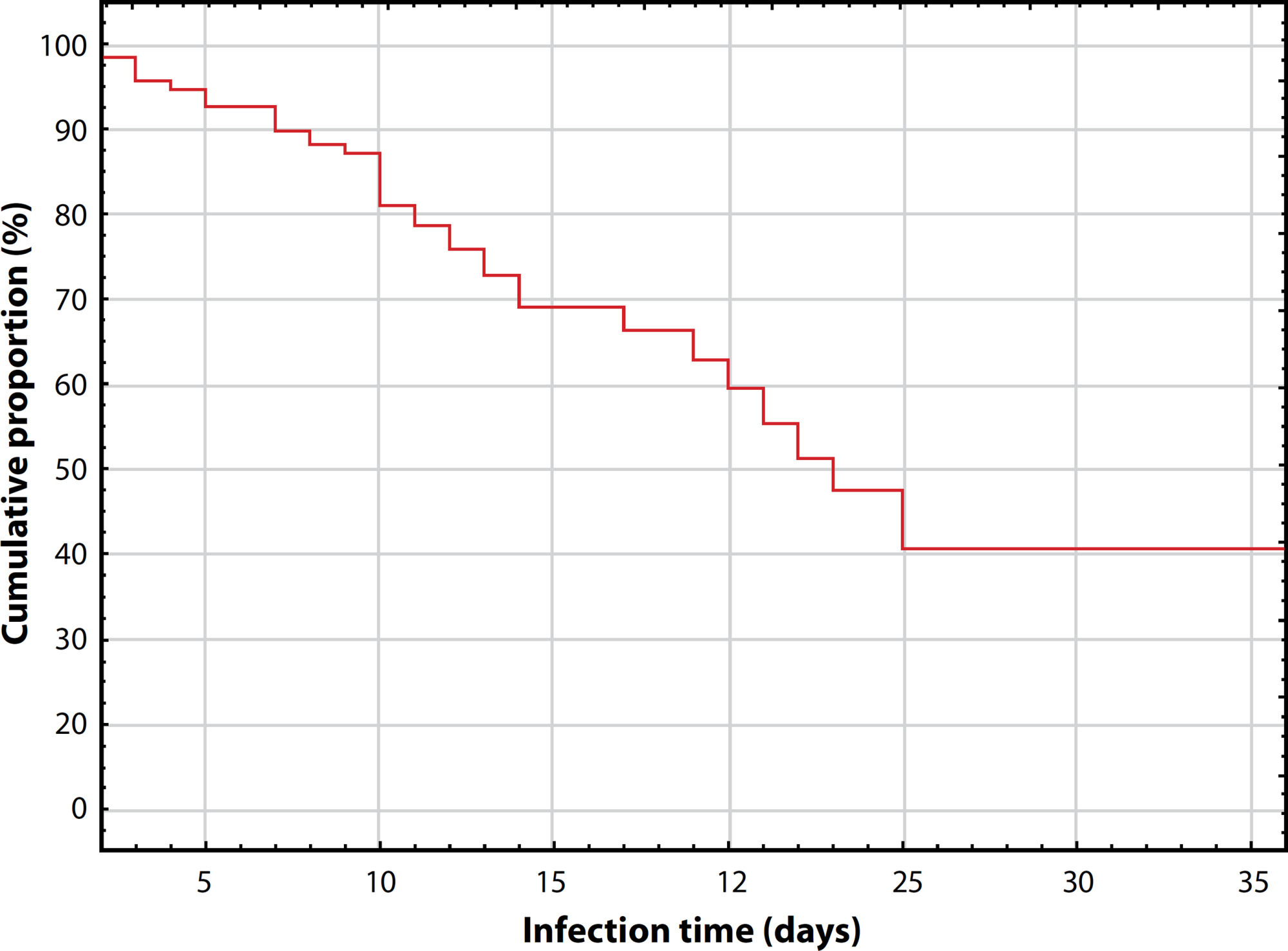
-
EXPERIENCE REPORT02-15-2021
Coronavirus infections: health care planning based on Orem’s Nursing Theory
Revista Brasileira de Enfermagem. 2021;74:e20200281
Abstract
EXPERIENCE REPORTCoronavirus infections: health care planning based on Orem’s Nursing Theory
Revista Brasileira de Enfermagem. 2021;74:e20200281
DOI 10.1590/0034-7167-2020-0281
Views0See moreABSTRACT
Objective:
to report the experience of professors and students of a graduate course on nursing care in coping with the new coronavirus (COVID-19) based on Self-Care Theory.
Method:
the active methodologies used were a literature search and seminar presentations, with an understanding of Orem’s theoretical concepts: health; man; self-care; universal, developmental and health deviation requirements; self-care activities; self-care deficits; the required therapeutic demand; nursing systems. The pandemic was considered a health deviation that requires critical thinking and nursing care planning. Methodological frameworks to classify nursing diagnoses, interventions, and outcomes were used.
Results:
for each health deviation, nursing systems were identified; self-care deficits, diagnoses; actions, interventions; and the form of assessment, outcomes.
Final considerations:
theoretical-practical reflections of the academic context support nursing care planning.
-
REFLECTION03-05-2021
Reflections on patient safety incident reporting systems
Revista Brasileira de Enfermagem. 2021;74:e20200307
Abstract
REFLECTIONReflections on patient safety incident reporting systems
Revista Brasileira de Enfermagem. 2021;74:e20200307
DOI 10.1590/0034-7167-2020-0307
Views0See moreABSTRACT
Objective:
To reflect on the main characteristics and recommendations of Incident Reporting Systems, discuss the population’s participation in reporting, and point out challenges in the Brazilian system.
Method:
Reflection study, based on Ordinance No. 529/13, which instituted the National Patient Safety Program, under Collegiate Board Resolution (CBR) No. 36/13; reflections by experts were added.
Results:
Reporting systems are a source for learning and monitoring, allow early detection of incidents, investigations and, mainly, the generation of recommendations prior to recurrences, in addition to raising information for patients and relatives. There is little participation of the population in the reporting, regardless of the type of system and characteristics such as confidentiality, anonymity, and mandatory nature.
Final Considerations:
In Brazil, although reporting is mandatory, there is an urgency to advance the involvement and participation of the population, professionals, and institutions. To simplify data entry by improving the interface and importing data from the reporting system is an objective to be achieved.
-
EXPERIENCE REPORT01-29-2021
Restructuring service at a mastology outpatient clinic during the COVID-19 pandemic
Revista Brasileira de Enfermagem. 2021;74:e20200571
Abstract
EXPERIENCE REPORTRestructuring service at a mastology outpatient clinic during the COVID-19 pandemic
Revista Brasileira de Enfermagem. 2021;74:e20200571
DOI 10.1590/0034-7167-2020-0571
Views0INTRODUCTIONCOVID-19 is a disease caused by the SARS-CoV-2 coronavirus (Severe Acute Respiratory Syndrome Coronavirus 2) and has brought a threat to public health worldwide. In need of immediate changes, adaptations tend to be the way out to avoid contamination that potentially does not distinguish race, color, gender().The global numbers of suspected and confirmed cases are […]See more
-
ORIGINAL ARTICLE12-13-2019
Hammock and nesting in preterm infants: randomized controlled trial
Revista Brasileira de Enfermagem. 2019;72:96-102
Abstract
ORIGINAL ARTICLEHammock and nesting in preterm infants: randomized controlled trial
Revista Brasileira de Enfermagem. 2019;72:96-102
DOI 10.1590/0034-7167-2018-0099
Views0See moreABSTRACT
Objective:
To compare the physiological variables and the sleep-wake pattern presented by preterm in nesting and hammock positions after diaper change.
Method:
This is a crossover randomized controlled trial. It was conducted with 20 preterm infants who, after diaper change, were placed in nests or hammocks. These preterm infants were evaluated for physiological variables (heart rate and oxygen saturation) and behavioral variables (sleep and wakefulness).
Results:
There was no statistically significant difference in the studied variables between nesting and hammock positions. However, regarding the categorical variable sleep, the comparison between the research phases for the hammock position showed differences between the baseline phase and the immediate recovery (p=0.00), baseline and late recovery (p=0.00), response and immediate recovery (p=0.00), response and late recovery (p=0.00).
Conclusion:
No differences were identified between the nest and the hammock; however, the use of the hammock favored the sleep of preterm infants compared to its non-use.

-
REFLECTION07-10-2020
Psychosocial risks and the health of health workers: reflections on Brazilian labor reform
Revista Brasileira de Enfermagem. 2020;73:e20190092
Abstract
REFLECTIONPsychosocial risks and the health of health workers: reflections on Brazilian labor reform
Revista Brasileira de Enfermagem. 2020;73:e20190092
DOI 10.1590/0034-7167-2019-0092
Views0See moreABSTRACT
Objective:
to reflect on the psychosocial risks and their impacts on the health of health workers in light of the Brazilian economic context and Labor Reform.
Method:
reflective study on the Brazilian Labor Reform and its impacts on health of health workers.
Results:
although the changes observed in the labor sphere have contributed to improvements in health and safety policies for, these changes have also contributed to the emergence of new risks arising from work activities, including psychosocial risks, which affect all occupational categories.
Final considerations:
we understand that the Brazilian Labor Reform carried out in 2017 leads to the weakening of labor relations, increases workers’ exposure to risks in the workplace, increases the risk of illness, and opposes the global movement of international organizations aimed at the prevention of aggravation in workers’ health and also at preserving their health.
-
ORIGINAL ARTICLE10-21-2019
Educational hypermedia in nursing assistance at birth: building and validation of content and appearance
Revista Brasileira de Enfermagem. 2019;72(6):1471-1478
Abstract
ORIGINAL ARTICLEEducational hypermedia in nursing assistance at birth: building and validation of content and appearance
Revista Brasileira de Enfermagem. 2019;72(6):1471-1478
DOI 10.1590/0034-7167/2018-0163
Views0See moreABSTRACT
Objective:
to build an educational hypermedia about nursing care at usual risk birth and to perform validation of content and appearance.
Method:
methodological research carried out following the following stages: content and planning of modules; media production and organization of tutorial units; organization of student space, tutor and communication between them; availability of hypermedia; assessment by experts in nursing and informatics; and implementation of proposed suggestions.
Results:
educational hypermedia showed to be a validated material, since it presented an optimum index of global content of 0.97 and statistical significance in the binomial test for the content and appearance.
Conclusion:
it is believed that the use of this material with undergraduate students in nursing will contribute to the quality of obstetric care, considering that it is an illustrated technology capable of favoring teaching-learning about normal humanized childbirth.
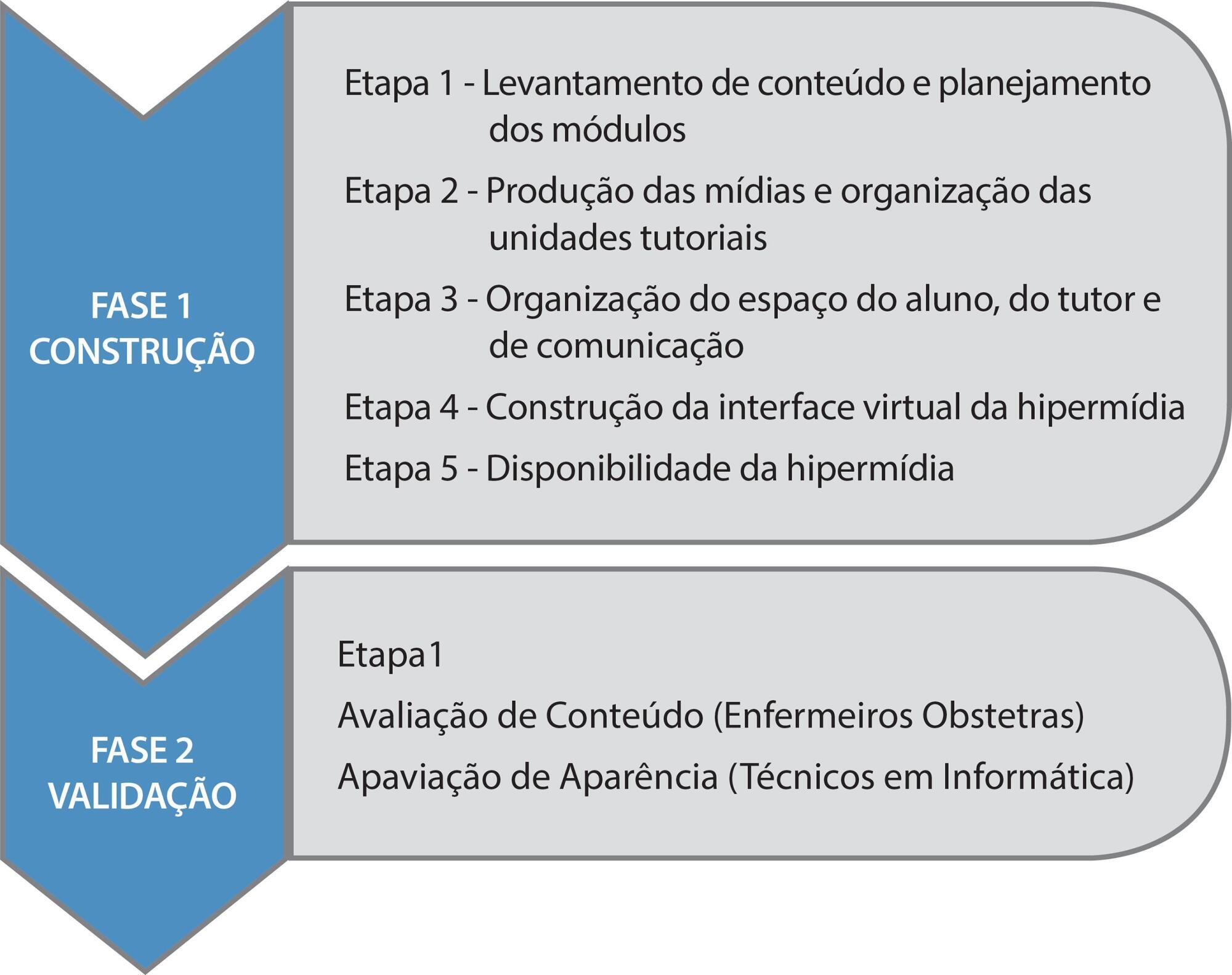
-
REVIEW03-30-2020
Nursing care in mental health based on the TIDAL MODEL: an integrative review
Revista Brasileira de Enfermagem. 2020;73(2):e20180177
Abstract
REVIEWNursing care in mental health based on the TIDAL MODEL: an integrative review
Revista Brasileira de Enfermagem. 2020;73(2):e20180177
DOI 10.1590/0034-7167-2018-0177
Views0See moreABSTRACT
Objectives:
to identify the applicability of the Phil Barker’s Tidal Model in mental health nursing care.
Methods:
an integrative literature review carried out by LILACS, MEDLINE, Scopus and Web of Science. Data were collected from December 2017 to March 2018. After selecting the studies, the sample totaled 24 articles.
Results:
the articles are in English (91.7%), were published in nursing journals (87.5%), are reflective and/or theoretical (50%) and have level of evidence VII (79.2%). The model brings contributions to nursing science, enabling person-centered care, with an emphasis on interdisciplinary work, nurses’ protagonism and the empowerment of subjects in mental suffering.
Final considerations:
the use of the Tidal Model enables changes in nurses practice working in the context of mental health. Its application by nurses who work in mental health services in Brazil is recommended.

-
ORIGINAL ARTICLE12-13-2019
Cervical cancer: knowledge, attitude and practice on the prevention examination
Revista Brasileira de Enfermagem. 2019;72:25-31
Abstract
ORIGINAL ARTICLECervical cancer: knowledge, attitude and practice on the prevention examination
Revista Brasileira de Enfermagem. 2019;72:25-31
DOI 10.1590/0034-7167-2017-0645
Views0See moreABSTRACT
Objective:
to evaluate the knowledge, attitude and practice of women on the cervical-uterine cancer screening and to investigate their association with sociodemographic variables.
Method:
a cross-sectional study, carried out from July to September 2015, with 500 women enrolled in the Basic Health Units of the Health District V, of the city of Recife-PE. For data collection, a semi-structured form was used. In statistical analysis, the Chi-square test and Fisher’s Exact Test were applied and, in the multivariate analysis, the Poisson model and Wald statistic.
Results:
the prevalence of adequate knowledge, attitude and practice was 35.2%, 98% and 70.6%, respectively. Adequate knowledge was associated with having no children, having a family income of two minimum wages and Spiritist/Afro-Brazilian religion.
Conclusion:
women carry out the examination, deem it necessary, but do not have adequate knowledge, which demonstrates the need for educational actions by nurses and other health professionals.
-
04-14-2021
Child behavior during the social distancing in the COVID-19 pandemic
Revista Brasileira de Enfermagem. 2021;74:e20200762
Abstract
Child behavior during the social distancing in the COVID-19 pandemic
Revista Brasileira de Enfermagem. 2021;74:e20200762
DOI 10.1590/0034-7167-2020-0762
Views0See moreABSTRACT
Objective:
To describe the daily activities performed by children from 6 to 12 years of age incomplete and analyze children’s behavior during social distancing in the face of the COVID-19 pandemic.
Methods:
Cross-sectional study with children in a learning stage living in Brazil. The data were collected via online form. Fisher’s exact test was applied to analyze the association of categorical variables with child behavior; when significant, it was used the odds ratio. It was considered results considered statistically significant those presenting values of p < 0.05.
Results:
Data from 530 children were analyzed: 50.3% female, 71.3% from the Southeast Region, 73% in fulltime social distancing, 52% presented anxiety, which was significantly associated with changes in sleep and appetite.
Conclusion:
The results indicate the need for parents/caretakers to stimulate moments for the child to express themselves, not minimizing their feelings and providing emotional support to mitigate the negative impact of these feelings on the child’s mental and physical health.
-
REVIEW09-29-2022
Nursing students’ learning from involvement in research projects: an integrative literature review
Revista Brasileira de Enfermagem. 2022;75(1):e20210053
Abstract
REVIEWNursing students’ learning from involvement in research projects: an integrative literature review
Revista Brasileira de Enfermagem. 2022;75(1):e20210053
DOI 10.1590/0034-7167-2021-0053
Views0See moreABSTRACT
Objective:
To identify the learning outcomes and skills obtained of undergraduate nursing students involved in research projects.
Methods:
This was an integrative literature review, based on a research protocol in the CINAHL Complete databases; Cochrane Central Register of Controlled Trials; Cochrane Database of Systematic Reviews; Cochrane Methodology Register; MedicLatina; MEDLINE, Scopus and JBI, including primary and secondary studies, published between 2015 and 2020.
Results:
A total of five heterogeneous articles were included, which were categorized using Kirkpatrick’s (adapted) model. Seventeen learning outcomes acquired through participation in research projects were identified, from the learning of new knowledge and skills to the development of new attitudes and behaviors.
Final considerations:
The involvement of nursing students in research projects is important to their professional development. Future investment in research on this topic can help cement the potential of this type of student involvement.
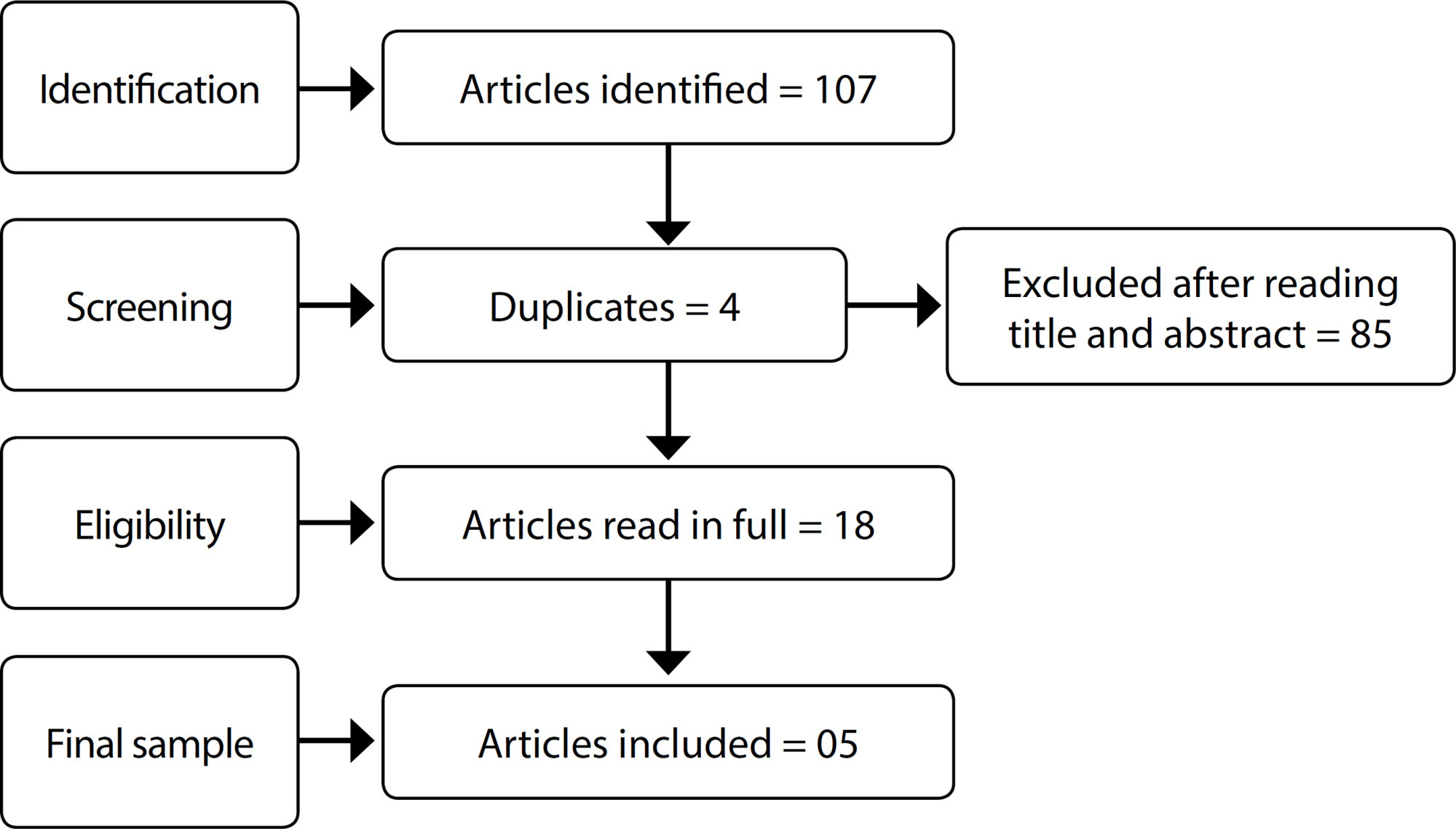
-
ORIGINAL ARTICLE12-05-2019
Quality of life related to health for heart failure patients
Revista Brasileira de Enfermagem. 2019;72:140-146
Abstract
ORIGINAL ARTICLEQuality of life related to health for heart failure patients
Revista Brasileira de Enfermagem. 2019;72:140-146
DOI 10.1590/0034-7167-2018-0368
Views0See moreABSTRACT
Objective:
To assess the quality of life related to health for heart failure patients and to relate sociodemographic and clinical data.
Method:
It is an observational and transversal study, with quantitative approach, carried out in a heart failure ambulatory in the state of Pernambuco.
Results:
In the sample (n=101), there was prevalence of men older than 60 years old, married and professionally inactive. The quality of life related to health, based on the Minnesota Living With Heart Failure Questionnaire, was considered moderate (34.3±21.6), being significantly related to age (p=0.004), functional class (p<0.001), and patients with chagasic cardiopathy (p=0.02).
Conclusion:
The quality of life in the HF group of chagasic etiology was more compromised, specially in the emotional dimension. It is suggested that studies on the hypothesis that longer ambulatory follow-up improves quality of life and that having Chagas disease interferes negatively with the quality of life of heart failure patients.
Search
Search in:
Nuvem de Tags
Adolescente (85) Atenção Primária à Saúde (239) COVID-19 (91) Criança (91) Cuidados de Enfermagem (269) Educação em Enfermagem (151) Educação em Saúde (139) Enfermagem (930) Enfermagem Pediátrica (86) Estudantes de Enfermagem (77) Estudos de Validação (131) Família (87) Idoso (208) Promoção da Saúde (99) Qualidade de Vida (104) Saúde do Trabalhador (86) Saúde Mental (145) Saúde Pública (82) Segurança do Paciente (150) Tecnologia Educacional (100)



